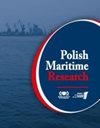Hierarchical Multiscale Fluctuation Dispersion Entropy for Fuel Injection System Fault Diagnosis
IF 2
3区 工程技术
Q2 ENGINEERING, MARINE
引用次数: 0
Abstract
Abstract Marine electronically controlled (ME) two-stroke diesel engines occupy the highest market share in newly-built ships and its fuel injection system is quite different and important. Fault diagnosis in the fuel injection system is crucial to ensure the power, economy and emission of ME diesel engines, so we introduce hierarchical multiscale fluctuation dispersion entropy (HMFDE) and a support matrix machine (SMM) to realise it. We also discuss the influence of parameter changes on the entropy calculation’s accuracy and efficiency. The system simulation model is established and verified by Amesim software, and then HMFDE is used to extract a matrix from the features of a high pressure signal in a common rail pipe, under four working conditions. Compared with vectorised HMFDE, the accuracy of fault diagnosis using SMM is nearly 3% higher than that using a support vector machine (SVM). Experiments also show that the proposed method is more accurate and stable when compared with hierarchical multiscale dispersion entropy (HMDE), hierarchical dispersion entropy (HDE), multiscale fluctuation dispersion entropy (MFDE), multiscale dispersion entropy (MDE) and multiscale sample entropy (MSE). Therefore, the proposed method is more suitable for the modelling data. This research provides a new direction for matrix learning applications in fault diagnosis in marine two-stroke diesel engines.分层多尺度波动色散熵在燃油喷射系统故障诊断中的应用
摘要船用电控二冲程柴油机在新建船舶中占有最大的市场份额,其燃油喷射系统具有重要的特殊性。燃油喷射系统的故障诊断是保证内燃机动力性、经济性和排放的关键,为此我们引入层次多尺度波动弥散熵(HMFDE)和支持矩阵机(SMM)来实现故障诊断。讨论了参数变化对熵计算精度和效率的影响。利用Amesim软件建立系统仿真模型并进行验证,然后利用HMFDE对共轨管高压信号在四种工况下的特征进行矩阵提取。与矢量化HMFDE相比,SMM的故障诊断准确率比支持向量机(SVM)提高了近3%。实验还表明,与层次多尺度色散熵(HMDE)、层次色散熵(HDE)、多尺度波动色散熵(MFDE)、多尺度色散熵(MDE)和多尺度样本熵(MSE)相比,该方法具有更高的准确性和稳定性。因此,所提出的方法更适合于建模数据。该研究为矩阵学习在船用二冲程柴油机故障诊断中的应用提供了新的方向。
本文章由计算机程序翻译,如有差异,请以英文原文为准。
求助全文
约1分钟内获得全文
求助全文
来源期刊

Polish Maritime Research
工程技术-工程:海洋
CiteScore
3.70
自引率
45.00%
发文量
20
审稿时长
>12 weeks
期刊介绍:
The scope of the journal covers selected issues related to all phases of product lifecycle and corresponding technologies for offshore floating and fixed structures and their components.
All researchers are invited to submit their original papers for peer review and publications related to methods of the design; production and manufacturing; maintenance and operational processes of such technical items as:
all types of vessels and their equipment,
fixed and floating offshore units and their components,
autonomous underwater vehicle (AUV) and remotely operated vehicle (ROV).
We welcome submissions from these fields in the following technical topics:
ship hydrodynamics: buoyancy and stability; ship resistance and propulsion, etc.,
structural integrity of ship and offshore unit structures: materials; welding; fatigue and fracture, etc.,
marine equipment: ship and offshore unit power plants: overboarding equipment; etc.
 求助内容:
求助内容: 应助结果提醒方式:
应助结果提醒方式:


